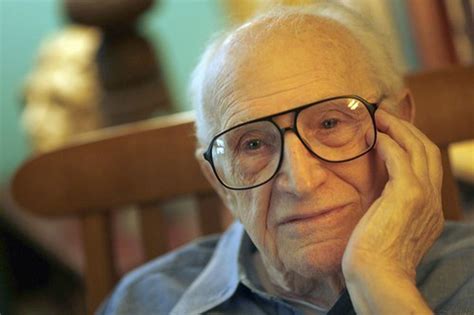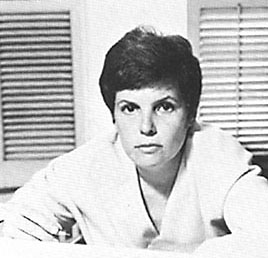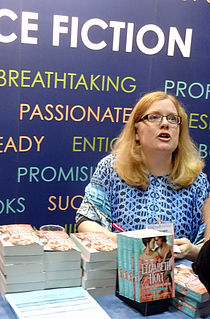A Quote by Millard Kaufman
She wrote poetry constantly; that was her "work". She was a slow bleeder and she slaved over it for long, exhausting hours, and many a middle of a night I could hear her creaking around the dead house with a pen in one hand, a clipboard and a flashlight in the other, refining her poems, jotting down the lines of a conceit. Writing never came easy for her; it gave her calluses. She never courted the muses, she wrestled them, mauled them all over the house and came up, after weeks of peripatetic labor, with a slim Spencerian sonnet, fourteen lines of imagistic jabberwocky.
Related Quotes
She didn't care anymore... and she got no pleasure from the work she did, but she did it. Everything bored her. She found that when she didn't have a notebook it was hard for her to think. The thoughts came slowly, as though they had to squeeze through a tiny door to get to her, whereas when she wrote, they flowed out faster than she could put them down. She sat very stupidly with a blank mind until finall 'I feel different' came slowly to her mind. Yes, she thought, after a long pause. And then, after more time, 'Mean, I feel mean.
She lay on her back and walked her fingers down her ribs, skipped them over her abdomen, and landed on her pelvic bones. She tapped them with her Knuckles. [. . .] I can hear my bones, she thought. Her fingers moved up from her pelvic bones to her waist. The elastic of her underpants barely touched the center of her abdomen. The bridge is almost finished, she thought. The elastic hung loosely around each thigh. More progress. She put her knees together and raised them in the air. No matter how tightly she pressed them together, her thighs did not touch.
For hours she danced and sang and flirted and did this thing that's-she did Marilyn Monroe. And then there was the inevitable drop. And when the night was over and the white wine was over and the dancing was over, she sat in the corner like a child, with everything gone. I saw her sitting quietly without expression on her face, and I walked towards her but I wouldn't photograph her without her knowledge of it. And as I came with the camera, I saw that she was not saying no.
Rebecca held her head high and swanned across the hallway, but as she neared the footman, she could see quite plainly that his gaze was not where it should be. She stopped dead and slapped her hands over her bosom. "Its too low, isn't it? I knew I shouldn't have listened to that maid. She might not mind her boobies hanging out for all to see, but i just can't-" Her brain suddenly caught up with her mouth. She removed her hands from her bosom and slapped them over her awful, awful, awful mouth.
When he held her that way, she felt so happy that it disturbed her. After he left, it would take her hours to fall asleep, and then when she woke up she would feel another onrush of agitated happiness, which was a lot like panic. She wished she could grab the happiness and mash it into a ball and hoard it and gloat over it, but she couldn't. It just ran around all over the place, disrupting everything.
She came into a room; she stood, as he had often seen her, in a doorway with lots of people round her. But it was Clarissa one remembered. Not that she was striking; not beautiful at all; there was nothing picturesque about her; she never said anything specially clever; there she was however; there she was.
Eventually she came. She appeared suddenly, exactly like she'd done that day- she stepped into the sunshine, she jumped, she laughed and threw her head back, so her long ponytail nearly grazed the waistband of her jeans. After that, I couldn't think about anything else. The mole on the inside of her right elbow, like a dark blot of ink. The way she ripped her nails to shreds when she was nervous. Her eyes, deep as a promise. Her stomach, pale and soft and gorgeous, and the tiny dark cavity of her belly button. I nearly went crazy.
The door burst open. Murphy came through it, her eyes living flames of azure blue, her hair a golden coronet around her. She held a blazing sword in her hand and she shone so bright and beautiful and terrifying in her anger that it was hard to see. The Sight, I realized, dimly. I was seeing her for who she was.
She sat leaning back in her chair, looking ahead, knowing that he was as aware of her as she was of him. She found pleasure in the special self-consciousness it gave her. When she crossed her legs, when she leaned on her arm against the window sill, when she brushed her hair off her forehead - every movement of her body was underscored by a feeling the unadmitted words for which were: Is he seeing it?
Where woman has taken her place in business she has found her method ready-shaped for her, and following that, she does her work,if with a certain amount of monotony, yet without undue fatigue. Her hours are fixed, and as a rule she gets needful change of scene as she goes to her business and returns to her home or the place where she lives. But the "home- maker" has not, nor can she have, any such change, and her hours are always from the rising of the sun beyond the going down of the same.
She stared at herself in the mirror. Her eyes were dark, almost black, filled with pain. She'd let someone do that to her. She'd known all along she felt things too deeply. She became attached. She didn't want a lover who could walk away from her, because she could never do that - love someone completely and survive intact if her left her.
Suddenly she felt strong and happy. She was not afraid of the darkness or the fog and she knew with a singing in her heart that she would never fear them again. No matter what mists might curl around her in the future, she knew her refuge. She started briskly up the street toward home and the blocks seemed very long. Far, far too long. She caught up her skirts to her knees and began to run lightly. But this time she was not running from fear. She was running because Rhett's arms were at the end of the street.
Day and night she had drudged and struggled and thrown her soul into her work, and there was not much of her left over for anything else. Being human, she suffered from this lack and did what she could to make up for it. If she passed the evening bent over a table in the library and later declared that she had spent that time playing cards, it was as though she had managed to do both those things. Through the lies, she lived vicariously. The lies doubled the little of her existence that was left over from work and augmented the little rag end of her personal life.
In the classics section, she had picked up a copy of The Magic Mountain and recalled the summer between her junior and senior years of high school, when she read it, how she lay in bed hours after she should have gotten up, the sheet growing warmer against her skin as the sun rose higher in the sky, her mother poking her head in now and then to see if she'd gotten up yet, but never suggesting that she should: Eleanor didn't have many rules about child rearing, but one of them was this: Never interrupt reading.







































